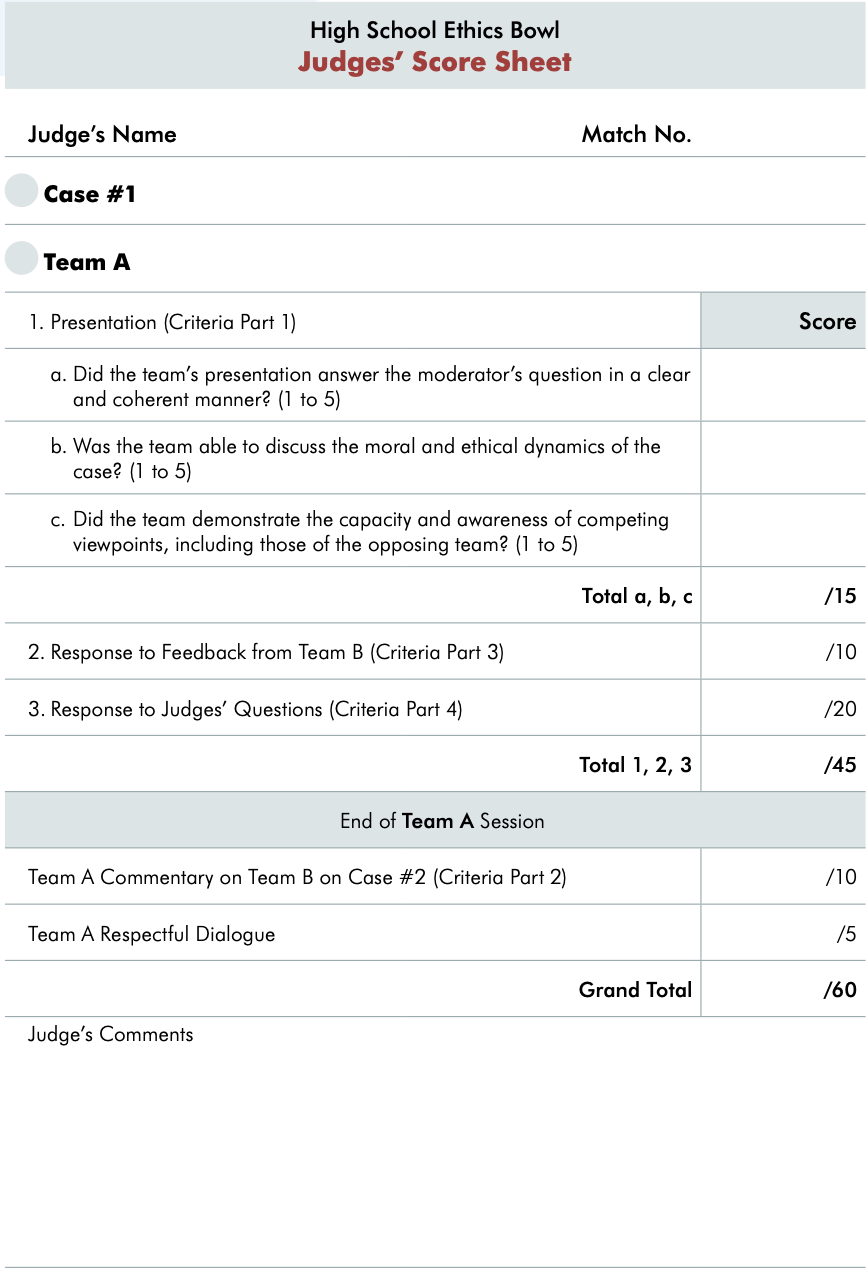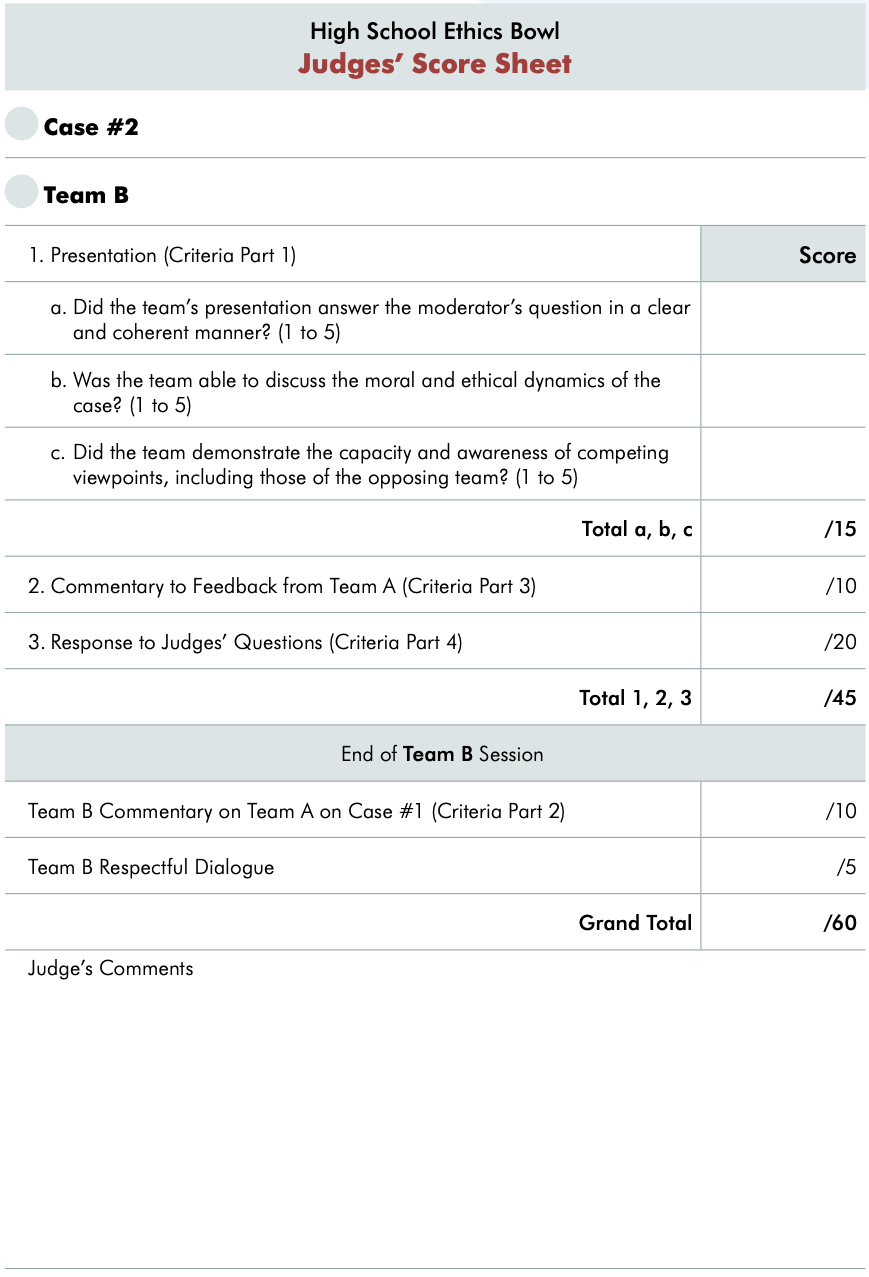pages 23-33
Rules and Resources


What to Expect during the Day
An Ethics Bowl has three competitive components:
- round robin, involving all teams
- semi-finals, with four highest scoring teams
- final round to determine the winning team
What happens in a round?
The room is set up as illustrated below. A moderator conducts the proceedings, poses a question related to cases the students have researched, and keeps track of time. Three judges evaluate team performances. (The audience does not participate.)

Steps in a Round
Each round involves two cases, and each team takes the “lead” on one case. The following steps show Team A as the lead on the first case:
Case #1
Moderator flips a coin, winning team chooses to lead or pass on Case #1. Moderator poses question for Case #1.
- Team A has 2 minutes to confer; 5 minutes to present position on Case #1.
- Team B has 1 minute to confer; 3 minutes to respond/ask questions.
- Team A has 1 minute to confer; 3 minutes to respond to Team B.
- Judges have 10 minutes to question Team A. (See Sample Questions.)
- Judges score both teams for Case #1 and write feedback for both teams.
- Moderator poses question for Case #2.
- Team B has 2 minutes to confer; 5 minutes to present position on Case #2.
- Team A has 1 minute to confer; 3 minutes to respond/ask questions.
- Team A has 1 minute to confer; 3 minutes to respond to Team B.
- Judges have 10 minutes to question Team B. (See Sample Questions.)
- Judges score both teams for Case #2 and write feedback for both teams.
Team Composition
- A team consists of three to seven members, with a maximum of two alternates.
- Team members may be selected from Grades 9 to 12 within the same high school.
- Team alternates may be placed onto the team roster due to an absence of a regular team member. Changes may be made during a competition but only between rounds, not during a match. If a team member is absent during a round, the teacher leader will alert the organizing committee, and provide the name of the alternate, prior to the match.
Judges and Moderators
- Judges and moderators cannot be family members or staff from the same school as a registered team.
- Judges may be selected from the community (e.g., university students, retired or practising teachers, representatives from not-for-profit or for-profit organizations, or any other appropriate group or organization).
- Judges do not need to be ethics experts, but must be willing to study selected ethical cases prior to the Ethics Bowl. They should be open-minded and prepared to take part in a judges’ training session prior to the Ethics Bowl.
- Judges may not converse with each other during a match, with the exceptions of during the questioning period and when filling out the team feedback forms. Judges may not discuss how they will be personally scoring the teams.
- During the question period, judges are encouraged to ask open-ended questions that encourage critical reflection on issues raised during the match.
- Judges are discouraged from speaking to team members during breaks.
Match Rules
1. Team members are not allowed to be in possession of downloading devices or written notes during a match.
2. The moderator controls the room and is expected to adhere to the timeline, as outlined in the Steps in a Round and in the Moderator’s Script.
3. Prior to the start of a match, team members are expected to shake hands.
4. When a team is presenting, everyone else in the room must remain silent.
5. Teacher leaders must not coach their team members during a match.
6. All procedural questions must be directed to the moderator.
7. During a match, team members may pass messages amongst themselves on the paper provided.
8. At the beginning of each new match, team members will introduce themselves to the judges.
9. Prior to presenting, teams must declare who will be speaking on the case. More than one member may speak during a match.
10. During the question round, team members may ask judges to repeat a question or ask for clarification. Team members are encouraged to quietly discuss potential responses to judges’ questions amongst themselves, and to elect one team member to respond to the question.
11. The Ethics Bowl will use a round-robin schedule to determine which teams move on to the semi-finals and finals.
12. The judges’ feedback forms for each team will be given to the teams’ teacher leaders.
13. At the end of a match, team members are once again expected to shake hands.
14. The moderator will declare the winner but not reveal scores.
15. Match wins are not based on the number scores assigned by the individual judges, but on the number of judges who give a win to a team. If the event of a tie, the number score will be the tiebreaker.
